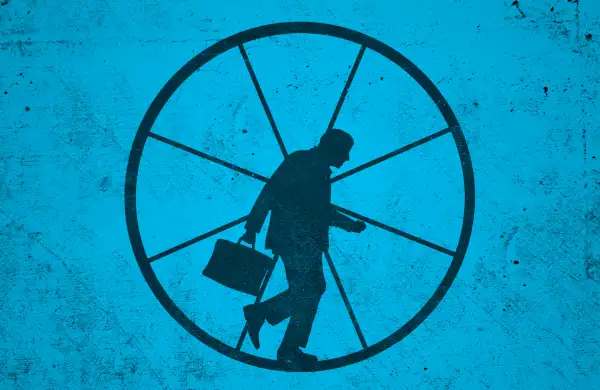How Not to Screw Up Your Life (Like Your Parents Did)

Your parents are lovely people, I am sure. And they undoubtedly love you, mostly. But when they serve as role models, they are often wrong.
You may object that you already know how far behind the times they are. If only that were true. In spite of how dismissive you may on occasion be, no matter how many times you troubleshoot their computers, you still sit in my office and tell me you are going to repeat what they got wrong, and avoid what they got right. You get it exactly wrong.
You begin by inexplicably trying to duplicate their career plan, or lack thereof. You replace your smartphone every three months and add a new app every other day, but then assume the job market is that of yesteryear. And if by some chance you suspect that competitive pressures will grow only more intense, you cling to the obsolete practices of the past ever more tightly. So you set off in stormy seas paddling your parents’ old rowboat.
That rowboat is built on no more than an education for a vaguely decent job, whose sole navigational aid is the hope that it will work out. In other words, you settle, for less than the best. And you’ve given it so little thought that you do not know whether it is actually the fourth best, or the sixth best you could do. You do this even though your parents relentlessly complain about their work: the stress, the boredom, the overbearing boss, the anti-social co-workers, the ethical shortcuts, all counting down to the liberation of retirement. That is what it means to settle, taking for granted that your work must be endured.
You assume, as do your parents, the only exceptions are the lucky or the crazy.
The alternative is, of course, to confront the tumultuous changes raining down upon us, bending them to our will. No, that does not mean you specialize in creating e-commerce phone apps using AI-mediated deep data with micro-payments. How could an appropriate response to the chaotically dynamic future be a pop-trendy focus on the next two minutes? So what should you do?
Focus on the course of your lifetime. Decide what your ideal life would look like. And please no “I want to be an astronaut who graduates to directing Oscar-winning movies, having founded a billion-dollar start-up on the weekend.” Be serious and practical–and idealistic. That takes a lot of very careful thinking. Nothing is more challenging than being visionary and practical at the same time. But your life is on the line and the effort should seem worth it.
Isn’t it better to start with the best choice and get as close to that as you possibly can, as resourcefully as you can? Isn’t that better than starting in the mushy middle and compromising downward? Like your parents did.
So you thoughtfully find your passion, thoughtfully develop your creative powers within that passion, together with whatever ancillary skills are needed. You plan how you will sell yourself and your ideas. You plot your pathways to multiple job alternatives, without which you will never be free to be happy.
And there's more
Of course, to be happy requires that you get another great choice of life right: choosing your life’s partner. You could use your parents’ time-tested technique of hormone-laced algorithms, with multiple candidates for audition. Or you might use the same thoughtful approach that drives career success. There are enough similarities. There is the lifetime horizon. There is passion, instead of mere interest; passion engaged to high purpose; and always a plan for long-term success. But isn’t such a methodical approach a romantic buzz-kill? So is divorce.
Finally, there is the last great question of life: to reproduce or not. Oddly enough, here you tend to view your parents’ choice–having you–with some considerable skepticism. You seem not always sure that having you was the right choice. You worry about the expense of having even one child; a kid might slow down your career, maybe make it more stressful than you fear it already will be. Then there is the planet to worry about. One minute the future is predictable enough to pursue an antiquated career, and the next it is too dangerous to have a child.
Let’s consider a radical choice: Perhaps we should be thoughtful about all of life’s important decisions. Perhaps we should avoid settling, as did too many of our parents. Maybe we should strive for the best possible career and family life. Maybe it is time to get thoughtful. Fast.
Larry Smith is an adjunct associate professor at the University of Waterloo in Ontario and author of the book No Fears, No Excuses: What You Need to Do to Have a Great Career, just published by Houghton Mifflin Harcourt.
